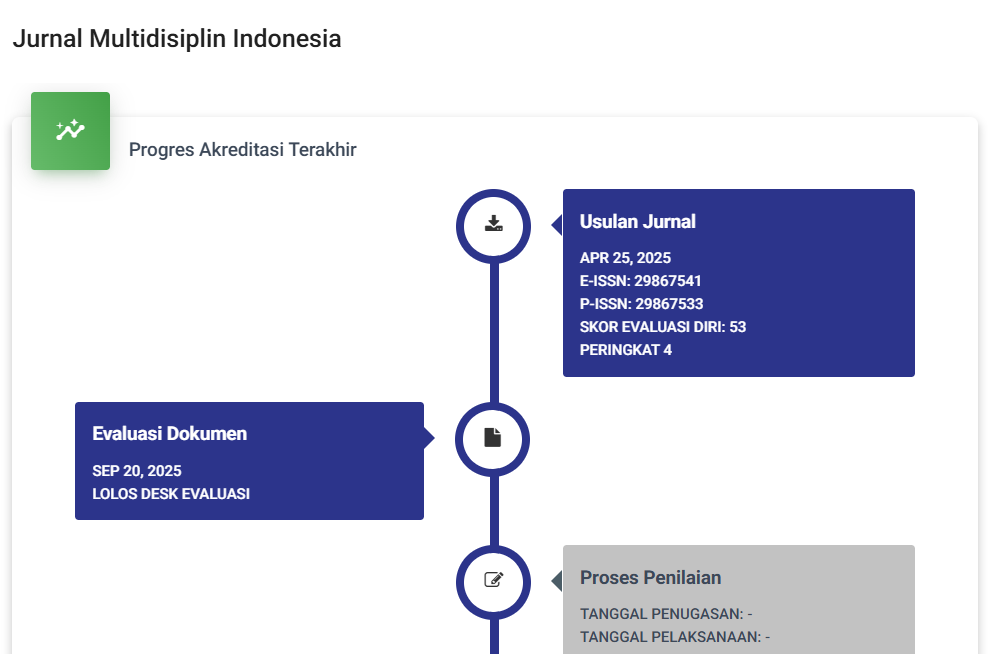Mitigasi Risiko Self-Diagnose Melalui Media Sosial: Pengembangan Model Komunikasi Kesehatan Berbasis Digital
DOI:
https://doi.org/10.62007/joumi.v3i1.439Keywords:
health literacy, health misinformation, health communication, Self-Diagnose, social mediaAbstract
Social media penetration reaching 60% of Indonesia’s population has transformed public health information-seeking patterns. The phenomenon of Self-Diagnose through social media, particularly among adolescents, poses significant health risks. This article employs a systematic literature review to analyze health communication strategies for mitigating Self-Diagnose risks. Results indicate that social media platform algorithms create echo chambers that promote normalization of health conditions and increase Self-Diagnose behaviors. Health misinformation spreads exponentially through viral sharing mechanisms. Effective communication strategies must integrate source credibility, accurate content quality, and optimal distribution mechanisms. The “Your Social Media is Not Your Doctor!” campaign is recommended to shift public paradigms. Comprehensive digital health communication policies through multisectoral collaboration are required.
References
DataReportal. (2024, February 20). Digital 2024: Indonesia — DataReportal – Global Digital Insights. DataReportal. https://datareportal.com/reports/digital-2024-indonesia
Johns Hopkins Medicine. (2023). Social media and Self-Diagnose: A growing concern among healthcare professionals. Johns Hopkins Medicine.
Johnstone, A., & Cosma, G. (2024). TikTok-inspired Self-Diagnose and its implications for educational psychology practice. Educational Psychology in Practice, 40(4), 1-18. https://doi.org/10.1080/02667363.2024.2409451
Kalra, G., Christodoulou, G., Jenkins, R., Tsipras, V., Christodoulou, N., Lecic-Tosevski, D., Marvanova, M., & Mollica, R. F. (2024). Mental health promotion, prevention, and intervention in the digital age: A framework for practice. International Review of Psychiatry, 36(3-4), 123-142.
Mascheroni, G., Saeed, M., Valenza, M., Cino, D., Dreesen, T., Zaffaroni, L. G., & Kurban, C. (2023). “Girls don’t get autism”: TikTok, Algorithmic Cultures, and the Gendering of Neurodiversity. Social Media + Society, 9(2), 1-15.
Nasution, R. A., Rusli, B., Hasan, I., & Febriani, D. (2021). Muslim millennials’ perception of halal food in the digital era: Does social media matter? Journal of Islamic Marketing, 12(4), 881-894.
News Medical. (2024, October 18). Study explores why teens self-diagnose mental health conditions through TikTok content. News Medical. https://www.news-medical.net/news/20241018/Study-explores-why-teens-self-diagnose-mental-health-conditions-through-TikTok-content.aspx
Osman, W., Mohamed, F., Elhassan, M., & Shoufan, A. (2021). Is YouTube a reliable source of health-related information? A systematic review. BMC Medical Informatics and Decision Making, 21(1), 237.
Petrie-Flom Center. (2025, April 10). Dr. TikTok? The impacts of misinformation on mental health Self-Diagnose. Petrie-Flom Center for Health Law Policy, Biotechnology, and Bioethics at Harvard Law School. https://petrieflom.law.harvard.edu/2025/04/02/dr-tiktok-the-impacts-of-misinformation-on-mental-health-Self-Diagnose/
PMC. (2021). Impact of social media usage on users’ COVID-19 protective behavior: Survey study in Indonesia. JMIR Publications. https://pmc.ncbi.nlm.nih.gov/articles/PMC10141255/
PMC. (2024). Exploring problematic TikTok use and mental health issues: A systematic review of empirical studies. JMIR Publications. https://pmc.ncbi.nlm.nih.gov/articles/PMC11924099/
Pratama, R., Sari, D. K., & Wijaya, M. (2023). Self-Diagnose and mental health knowledge among Indonesian university students: A cross-sectional study. Indonesian Journal of Psychology, 15(2), 145-158.
Psychology Today. (2024, February 29). TikTok’s growing Self-Diagnose culture. Psychology Today. https://www.psychologytoday.com/us/blog/living-psyched/202402/tiktoks-growing-Self-Diagnose-culture
Saputra, A., & Dewi, L. K. (2019). Social media usage and mental health outcomes among Indonesian adults: A longitudinal study. Asian Journal of Social Psychology, 22(3), 287-295.
Singh, A., Patel, R., & Kumar, S. (2024). Health misinformation in the digital age: Definitions, implications, and mitigation strategies. Journal of Medical Internet Research, 26(4), e45231.
Statista. (2024). Indonesia: Social network penetration Q3 2024. Statista. https://www.statista.com/statistics/284437/indonesia-social-network-penetration/
Zhao, Y., & Zhang, J. (2022). Social media and health behavior modification: A systematic review of intervention strategies. Digital Health, 8, 1-15.
Downloads
Published
How to Cite
Issue
Section
License
Copyright (c) 2025 Vita Safira, Farida Nurul Rahmawati

This work is licensed under a Creative Commons Attribution-ShareAlike 4.0 International License.







